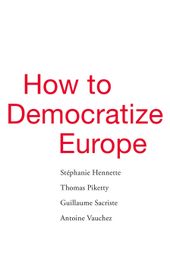How to democratize Europe?
Four distinguished French public intellectuals, Stéphanie Hennette, Thomas Piketty, Guillaume Sacriste, and Antoine Vauchez , have written a draft treaty establishing a parliamentary assembly for the Eurozone, its members drawn mainly from national parliaments. During this event, Antoine Vauchez will discuss the T-Dem proposal and the key issues raised by ensuing debate with an interdisciplinary group of lawyers and political scientists from the Amsterdam Centre for European Studies (ACES).
The European Union is struggling. The rise of Eurosceptic parties in member states, economic distress in the south, the migrant crisis, and Brexit top the news. But deeper structural problems may be a greater long-term peril. Not least is the economic management of the Eurozone, the nineteen countries that use the Euro. How can this be accomplished in a way generally acceptable to members, given a political system whose structures are routinely decried for a lack of democratic accountability? How can the EU promote fiscal and social justice while initiating the long-term public investments that Europe needs to overcome stagnation? Among many longstanding grievances is the charge that Eurozone policies serve large and wealthy countries at the expense of poorer nations. It is also unclear who decides economic policy, how the interests of diverse member states are balanced, and to whom the decision-makers are accountable.
Four distinguished French public intellectuals, Stéphanie Hennette, Thomas Piketty, Guillaume Sacriste, and Antoine Vauchez, have responded with a draft treaty establishing a parliamentary assembly for the Eurozone, its members drawn mainly from national parliaments. This ‘T-Dem’ proposal has been translated into multiple languages, including Dutch and English, and has sparked a wide international debate, a selection of which has recently been published as How to Democratize Europe. Antoine Vauchez, one of the co-authors, will discuss the T-Dem proposal and the key issues raised by ensuing debate with an interdisciplinary group of lawyers and political scientists from the Amsterdam Centre for European Studies (ACES), followed by Q&A with the audience.
The Visions of Europe lecture series brings prominent European policy makers and academics to Amsterdam to address urgent European and global issues.
About the speakers
Antoine Vauchez is CNRS Research Professor and Director of the European Centre for Sociology and Political Science at the University of Paris I Panthéon-Sorbonne. He has published widely on the relationship between professional expertise and politics in the European integration process. He is the author of Brokering Europe: Euro-Lawyers and the Making of a Transnational Polity (Cambridge University Press, 2015), as well as several recent articles on economists, central banks, and EU economic governance. He is a co-author of the ‘T-Dem’ proposal and How to Democratize Europe (Harvard University Press, 2019).
Nik de Boer is Assistant Professor in Constitutional Law at the UvA. His research focuses on constitutional law, EU law and political theory. His 2018 PhD thesis ‘Judging European Democracy’ was awarded the triennial Dissertation Prize of the Dutch Association of Constitutional Law.
Christina Eckes is Professor of European Law at the UvA, and Director of the Amsterdam Centre for European Law and Governance (ACELG). Her current research interests include integration and disintegration dynamics in EU law and the legal limits to European integration. Her latest book is EU Powers Under External Pressure. How the EU’s External Actions Alter Its Internal Structures (Oxford University Press, 2019).
Jonathan Zeitlin is Distinguished Faculty Professor of Public Policy and Governance in the Department of Political Science at the UvA, and Academic Director of ACES. His current research focuses on new forms of ‘experimentalist’ governance within and beyond the EU. He has recently guest edited special issues of the European Journal of Public Policy on ‘EU Socio-Economic Governance since the Crisis’ (2018) and ‘The European Union beyond the Polycrisis?’ (2019).
Daniel Mügge is Professor of Political Arithmetic at the Political Science Department of the UvA. His research focuses on the political economy of macroeconomic indicators and the political origins of the formulas through which we calculate them. He is the Principal Investigator of the Fickle Formulas project, which is supported by a European Research Council (ERC) Starting Grant and a Dutch Scientific Research Council (NWO) Vidi grant. He has also published widely on financial regulation within and beyond the EU, including Widen the Market, Narrow the Competition: Banker Interests and the European Capital Market (ECPR Press, 2010, based on his prize-winning PhD thesis) and Europe and the Governance of Global Finance (Oxford University Press, 2014).

:rgb(-15)

:rgb(-25)

:rgb(8)
